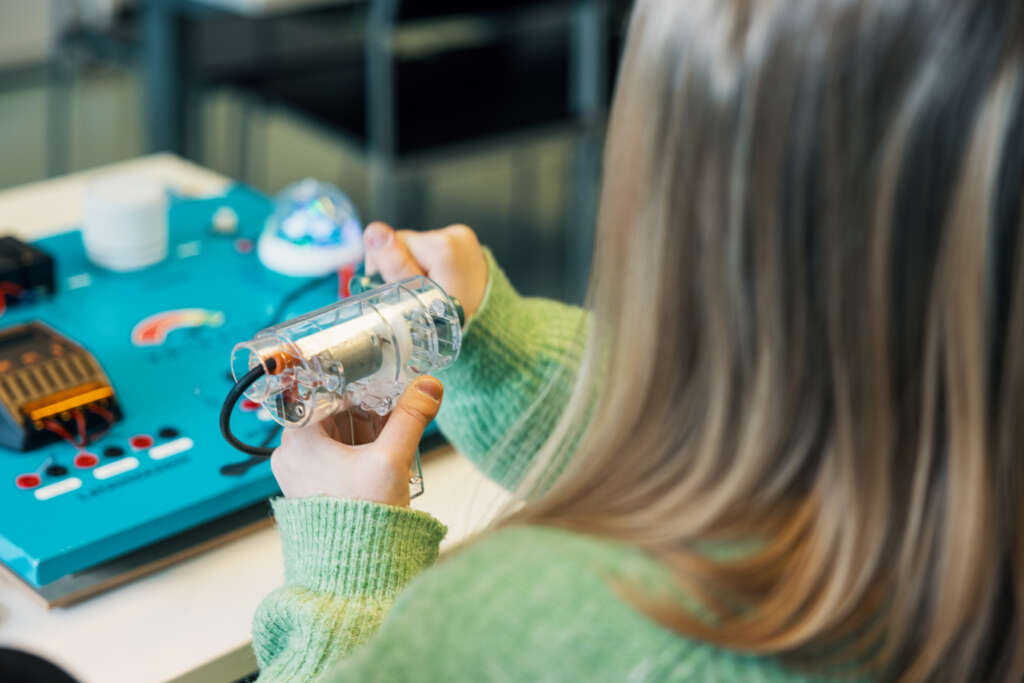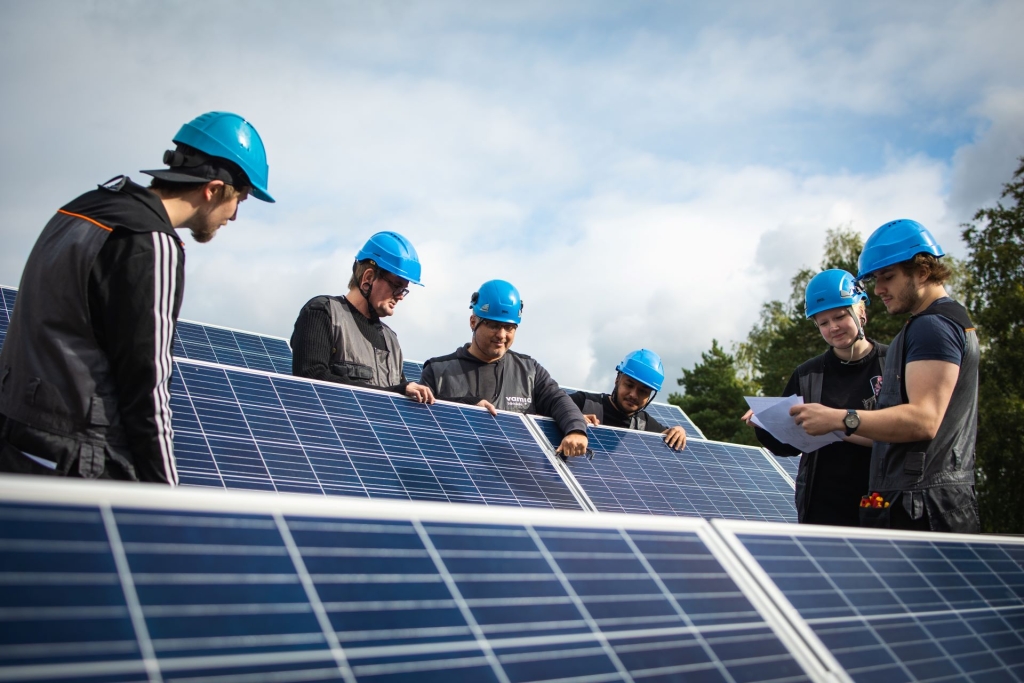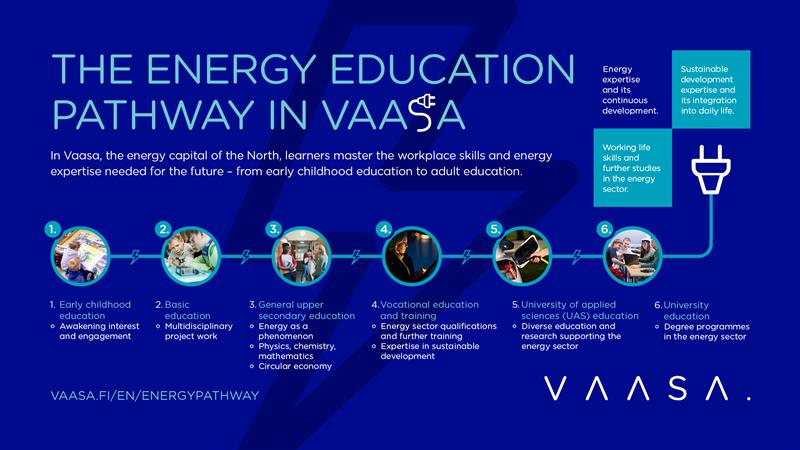
Energy education pathway in Vaasa
In Vaasa, the Nordic energy capital, students master future working life skills and energy expertise.
Here, the energy education pathway is in place, which extends from early childhood education to higher learning institutions.
One of the three main goals of the City of Vaasa 2022-2025 strategy is to make Vaasa carbon-neutral by 202X. Our goal is to be the most energy-smart and energy-efficient city in Finland.
Energy education in early childhood education
Vaasa’s early childhood education and preschool energy pathway
Energy education is part of everyday pedagogy. Play is a central way of working in both early childhood education and preschool education. Play enables movement, exploration and action. Daily life consists of comprehensive knowledge and versatile forms of learning. The activities are guided by the basics of the early childhood education plan 2022 as well as the basics of the preschool education plan 2014.
The central goal of the energy pathway in early childhood education and preschool education is the awakening of children’s interest and participation. Below are examples of the contents of energy education:
Nature and exercise
- Getting to know nature
- Respect for nature
- Getting to know the local environment
Sustainable development
- The principles of sustainable development are recognised and followed
- Recycling
- Sorting waste
- Natural materials
- Toy maintenance
Technology supported by the digital plan for early childhood education and preschool education
- Digital competence
- Technology skills
- Experimental and exploratory learning
- Programming while playing
- Digital documentation
Multiliteracy, supported by the cultural path of early childhood education and preschool education
- Searching for information
- Phenomena and concepts
Energy education in basic education
Finnish-speaking basic education
In basic education, the theme of energy is discussed from many different perspectives during grades 1–9. Content suitable for the age level and the goals of the subjects are highlighted in the different grades. Below are examples of courses to study:
Energy path for grades 1-3
- Energy saving and environmental protection
- Nutrition and the food chain
- Heating
Energy path for grades 4-6
- Waste recycling and saving energy
- Electric energy, saving electricity
- Electricity and heating solutions for your home as well as costs
Energy path for grades 7-9
- Visits to energy cluster companies, sponsored companies, Energy Week – utilisation
- Local energy production
- Food production in Ostrobothnia
- Energy self-sufficiency at the national level, energy sources and availability
- Renewable energy sources
- Sustainable development
Swedish-speaking basic education
The energy path for grades 1–6
All courses deal with energy saving and environmental protection, in a way that is suitable for the age group of the pupils.
Grades 1–3:
- forms of water
- water cycle
- people and food – food chain
- Vaasan Sähkö’s “Hey, everything works” educational package for the 2nd grade course
- heat
Grades 4–6:
- sorting waste
- visit to Stormossen or a visit by Stormossen to the school
- The human body – people need energy
- recycling
- electricity
- non-renewable and renewable energy sources
Multidisciplinary learning units of basic education:
- Maritime Vaasa
- Sustainable lifestyle – Sustainable people – Sustainable planet
- Me in the world
Borgaregatans skola, grades 7–9
Energy is discussed from different perspectives, mainly in the teaching of physics and chemistry:
- different forms of energy and energy conversion
- comparison of different energy sources for electricity production
- electric energy transport and costs
- energy saving and sustainable development
- energy content of food
Energy production and sustainable development
This year’s 9th grade will have a theme week focusing on energy and sustainable development in the spring. The purpose is to make pupils aware of the issues promoting sustainable development, such as how electricity and heat are produced with renewable natural resources locally and nationally.
The programme includes, among other things
- a visit to Stormossen, Westenergy and Vaasan Sähkö
- workshops related to solar panels and hydro and wind power plants
- lectures and project work related to the theme
Hållbarhet och energi i Vasa övningsskola

Energy education in upper secondary schools and vocational education
Vocational education – Vamia
Vamia is a multidisciplinary vocational education organisation, where approximately 5,000 students study annually. Vamia offers vocational training for young people, adults and working and business life – in three languages. At Vamia, you have the opportunity to build your own study path or update your skills to meet the needs of a changing working life.
At Vamia, energy education is a natural part of the studies. Energy studies are integrated into the teaching, and Vamia has modern learning environments to ensure energy competence.
Good connections to working life and competent teachers
Vamia has connections to working life and offers many degree courses in the energy sector. Students have good opportunities to enter working life, and Vamia has access to a sufficient number of companies in the energy sector available for on-the-job training in all degrees.
Vamia has modern learning environments that make it possible to learn energy skills. Work-based learning in energy sector jobs is an integral part of the students’ studies. After graduation, a significant proportion of students find employment with energy sector companies.
Vamia is also an international educational institution. Students have the opportunity to complete studies and on-the-job learning abroad as well. You can acquire a foreign exchange destination yourself or use the educational institution’s partners from numerous different countries. All of Vamia’s education programmes offer opportunities for exchange abroad and international experiences.
The optional study offer supports knowledge of the energy sector and related skills. Working life and business services actively offer additional and continuing education opportunities and apprenticeships for working life.
Cooperation with educational institutions
VAMK pathway
Students can continue directly from Vamia to Vaasa University of Applied Sciences without the need for certificate-based selection or entrance exams. A student can apply for the VAMK pathway, and during their third year, they will complete 30 ECTS credits of university of applied sciences studies. The VAMK pathway is available in the following qualification programmes: social and health care (practical nurse), business, vehicle technology, mechanical and production technology, electrical and automation technology, and information and communications technology (software developer and IT support specialist).
Cooperation with grades 7-9
All lower secondary school students in the region are offered the opportunity to explore Vamia’s energy sector education offerings and professions. Students also have the opportunity to learn more about the profession that interests them by visiting and attending Vamia’s classes for one day. Lower secondary school students can also participate in the cheerful and hands-on Taitaja9 competition related to technical fields.

Upper secondary school education
Upper secondary school education at the City of Vaasa takes place at Lykeion, a bilingual upper secondary school campus, where more than a thousand upper secondary school pupils study each year. As a general education, the upper secondary school steers pupils towards a matriculation examination to qualify for entry into higher education.
Vaasan Lyseon lukio
The hard core of energy education consists of mathematics, physics and information technology studies. In addition, energy education is integrated into the subjects. There is close cooperation with Vaasa’s higher education institutions.
Students at Vaasa lyseon lukio complete research assignments related to the energy sector as part of their physics and chemistry studies, under the guidance of university and university of applied sciences staff, in the facilities of both institutions during their second and third years of study. In addition, Vaasan Lyseon Lukio and LUMA Centre Ostrobothnia have cross-institutional programmes, including further training for general upper secondary school teaching staff. Cooperation with the universities of Vaasa is close also in many other ways.
Direct routes to Vaasa’s higher education institutions
Vaasan Lyseon Lukio (upper secondary school) offers fast track physics courses for the University of Vaasa’s energy and information technology education programme.
In cooperation with VAMK, separate pathways have been created, on the basis of which courses studied at Vaasan Lyseon Lukio can provide students with a study place at VAMK.
Vaasan Lyseon Lukio’s information technology studies also include a set of three courses with an emphasis on programming, the completion of which is a criterion for direct entry to both the University of Turku and the University of Vaasa.
Working life connections and international education
Vaasan Lyseon Lukio works together with the Vaasa region’s energy industry and educational institutions, e.g. through company visits, information corners and materials.
Every general upper secondary school student visits an energy sector company at least once during their studies. The visits typically take place during the second or third year. During the visits, students are introduced to research, development, and implementation of sustainable energy solutions, and given an overview of the sector’s future. The visits provide insight into various energy sector study pathways and encourage students to consider career options from the industry’s perspective.
Physics teaching aims to utilise Vaasa’s energy cluster through various types of practical examples, where the theoretical part of the teaching can naturally be connected to practical problems.
Vaasan Lyseon Lukio’s international education is extensive and energy education is also integrated into the teaching. The international education plan of both Vaasan Lyseon Lukio and Vasa Gymnasium is accredited.
Vasa gymnasium
All first-year pupils are taken on a familiarisation visit to one of the companies in the Vaasa energy cluster. In this way, pupils get information about the work opportunities of the Vaasa energy cluster and an understanding of the importance of industry for our region. However, the pandemic has prevented visits in recent years.
An annual energy course is offered. In recent years, the course has been very popular; about a third of the school’s pupils choose to complete it. The course provides the basic information on energy technology, which is needed to meaningfully follow energy discussions in the media. The course also serves as a gateway to optional (in-depth) physics courses.
The course includes, among other things:
- The difference between energy and power as well as their different units
- conservation of energy
- different power plants
- marketing
- familiarisation visits
Novia University of Applied Sciences has a positive attitude towards cooperation. At the time of writing, in the spring of 2023, our pupils are offered one hydrogen technology and one battery technology course arranged by Novia.
Teachers visit an energy cluster company approximately once every three years to gain inspiration and information to share with the pupils.
What is new this academic year is that in the spring of 2023, a theme week will be arranged, for which pupils can choose a theme. As a theme, you can choose technology that has a clear connection to the energy path, and also in other themes, such as economics, you learn about entrepreneurship.
Hållbarhet och energi i Vasa övningsskola
Energy education in higher education institutions
Vaasa University of Applied Sciences
Energetic know-how! Graduates of the working life oriented studies at Vaasa University of Applied Sciences (VAMK) are skilled, internationally-minded professionals who meet the needs of energy technology companies. The vibrant Vaasa region offers excellent employment opportunities. They will lead you straight to the heart of the green transition!
The education provided at VAMK emphasises energy expertise in a variety of ways. We collaborate closely with other universities and the region’s energy technology cluster, the most significant of its kind in the Nordic countries.
Our key areas of energy expertise include:
- ·Smart power grids
- Renewable energy
- Carbon neutrality
- Energy storage
A significant part of the engineering education takes place at the campus’s advanced Technobothnia laboratory.
University of Vaasa
At the University of Vaasa, you can study business, technology, administration, and communication. We train responsible and internationally oriented leaders and experts. We graduate innovators and visionaries who think in new ways.
We offer Bachelor’s, Master’s, Master of Science in Engineering, and Doctoral degrees. We also offer several master’s programmes entirely in English. In addition, you can study at our open university or get further education while you’re already in working life. Our online introductory courses let you learn more about different academic subjects and university studies.
In addition to computer simulations, engineering students also get to carry out laboratory exercises at Technobothnia.
MSc (Eng) graduates are solving the challenges of sustainable development
Graduates with a master’s degree in engineering from the University of Vaasa have excellent knowledge and skills to promote sustainable development by advancing the adoption of renewable energy, developing and implementing smart and energy-efficient technologies, utilising data and AI responsibly, and strategically leading innovation, product development, and projects.
You can complete a bachelor’s degree in engineering through the Sustainable Energy and Smart Technology programme in the following study tracks:
- Automation and Information Technology
- Data Architecture
- Electrical and Energy Engineering
- Industrial Engineering and Management
After completing a bachelor’s degree in engineering or an equivalent engineering qualification from another institution, you will graduate as a Master of Science in Engineering (MSc Eng) in one of the following programmes and study tracks:
The MSc (Eng) study tracks offered in the Electrical and Energy Engineering programme are:
- Energy Engineering
- Electrical Engineering
The MSc (Eng) study tracks offered in the Computing Science programme are:
- Automation and Robotics
- Data Engineering and Artificial Intelligence
- Sustainable and Autonomous Systems
The MSc (Eng) study tracks offered in the Industrial Engineering and Management programme are:
- Industrial Systems Analytics
- Strategic Project Management
For more information about studying at the University of Vaasa, please visit our website: https://www.uwasa.fi/en
Novia University of Applied Sciences
Finland’s largest Swedish-speaking university of applied sciences
Novia University of Applied Sciences offers high-quality professional university education and continuing education oriented towards working life. Novia has RDI activities, which is essential for the surrounding areas, and in Vaasa the main focus is on sustainable energy technology.
In Vaasa, the Faculty of Technology and Seafaring focuses strongly on the training of engineers, and every second engineer employed by the Vaasa energy cluster has graduated from Novia. Here, the engineering education as well as different orientation options within full-time education is extensive, and includes the following fields:
- Civil and Construction Engineering
- structural design
- construction production
- HVAC
- master builder
- Electrical Engineering and Automation
- electric power
- automation
- energy technology
- information technology
- land surveying
- mechanical and production engineering
- mechanical engineering
- operation and maintenance technology
- vehicle and transport technology
- production economics.
All areas of engineering education offered by Novia have connections to energy technology, and since sufficient expertise in a certain field requires specialisation, engineering education is able to offer just such an opportunity for application. Vaasa’s energy cluster is generally very focused on electricity and machinery, which explains why engineers from these fields are clearly hired the most. There is naturally also a need for general experts in energy technology, but there are significantly fewer of them, and in the end, all energy technology solutions include both an electrical and a mechanical part. Construction technology, on the other hand, connects directly to energy technology by focussing on technology related to energy-efficiency and climate-smart buildings, while other engineering trends have their own special connections to energy technology.
As a whole, the education offered by Novia is strongly based on the working life of the region, and the current education is designed in close dialogue with business life and the energy cluster. This is also confirmed by how well engineers who graduate from Novia are employed after graduation (basically full employment).
Energy education working group
The City of Vaasa’s goal is to be the Nordic energy capital: the Vaasa energy training pathway is mentioned as one of the measures in the city’s strategy.
Energy education pathway in Vaasa (pdf)
Vaasa will be the Nordic energy capital, where students master future working life skills and energy expertise, ranging from early childhood education to adult education.
Objectives
The aim is to create an educational pathway in the Vaasa region, whereby the interests of children and young people in energy-related matters are constantly maintained and their awareness of the importance of the energy sector is increased.
Energy awareness can be promoted in early childhood education and primary schools by learning about various phenomena (water, heat, recycling, saving energy), for example. In basic education, students are offered energy-themed events and competitions.
Work group activities
The practical coordination of the Energy Education Strategy is done through the bilingual Energy Education Working Group.
The working group has representatives from all levels of education (Finnish- and Swedish-language basic education, general upper secondary schools, Vamia) including early childhood education as well as the region’s higher education institutions, Technobothnia, and the LUMA Centre.
The work group meets at least four times a year, more often if necessary.
At the meetings, we review the activities of the educational institutions of the energy education pathway, plan activities and events, and share experiences.
Work group members:
- Stenbacka Åsa, Vamia, Chairperson
- Aho Mikko, Vamia
- Borgmästars Mats, Vasa Övningsskola
- Granholm Patric, Novia
- Hautala Jukka & Niemelä Riitta, VAMK
- Kallio Seppo, Vasa gymnasium
- Ketola Kim, Technobothnia’s coordinator
- Koljonen Janne, University of Vaasa / LUMA-keskus
- Kärki Anne, basic education in Finnish
- Pakkala Susanna, Vamia (secretary)
- Perttu Jaakko, Lyseon Lukio
- Punkari Johanna, Urban Environment Sector
- Rokala Sami, basic education in Swedish
- Ropponen Mikael, Lyseon lukio/teacher network responsibility
- Ylikantola Sari, early childhood education

